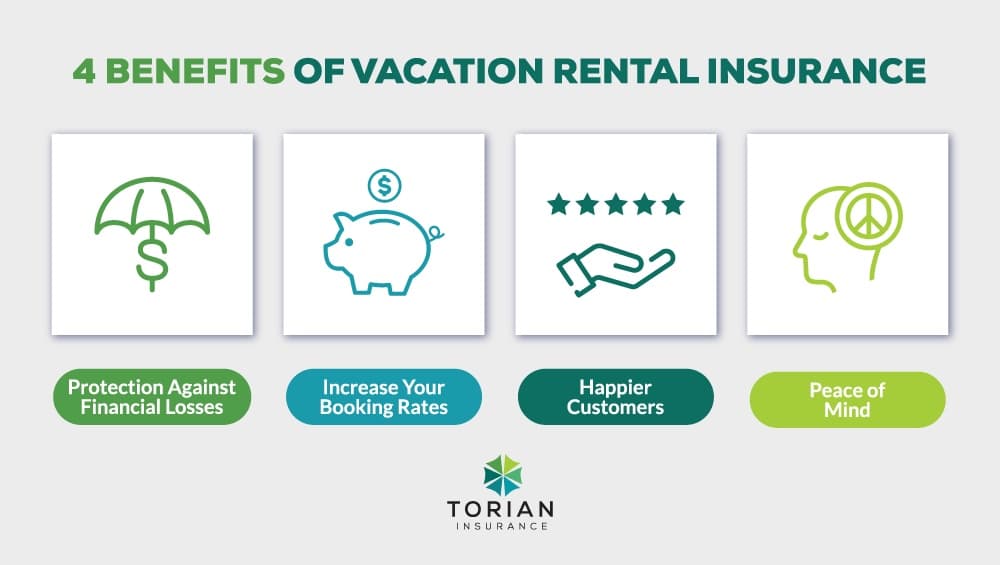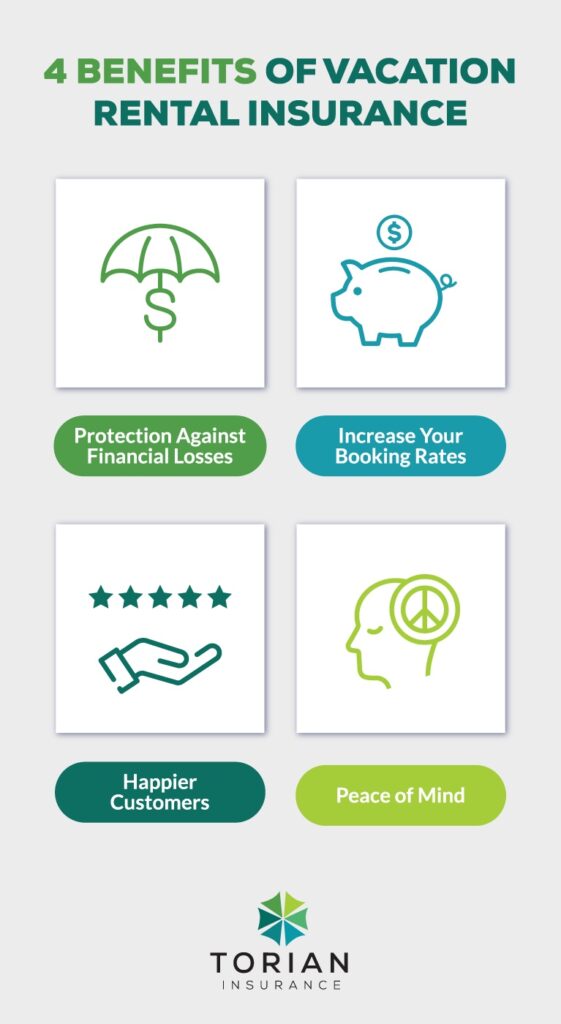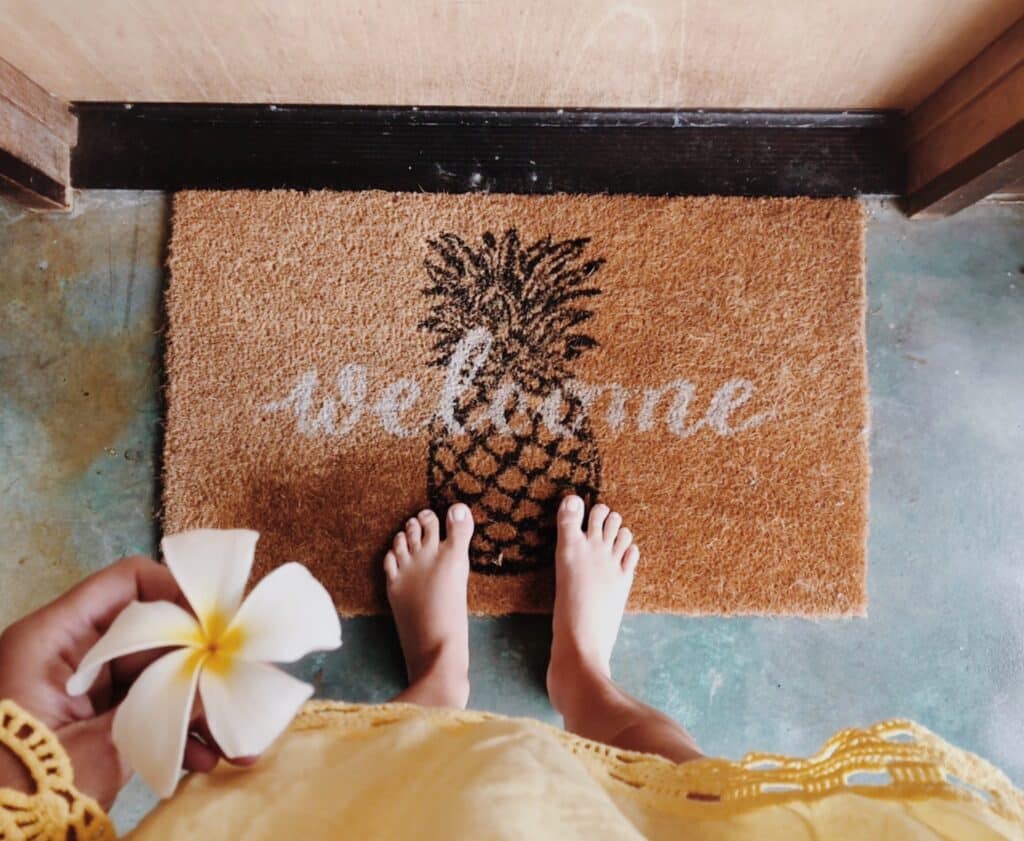Owning a vacation rental comes with plenty of perks. Not only do you have somewhere to rest your head when you want to go on vacation, but you can also generate a meaningful stream of income from your property.
But what about vacation rental insurance?
Your property is valuable. When you rent it to someone else, there’s always the potential that they may damage it. Moreover, you may be liable for financial damages if someone is injured on your vacation rental property. But is vacation rental insurance really worth the premiums?
What Are the Benefits of Vacation Rental Insurance?


Vacation rental insurance, or short-term rental insurance, comes with several benefits, and they’re not all related to losses and claims. Believe it or not, having a quality insurance plan increases your booking rates and leads to happier customers. Find the details of the four most exciting benefits of this type of insurance below.
Protection Against Financial Losses
The most obvious benefit of having vacation rental insurance is protection against financial losses. When damages occur in your vacation rental property, you may find yourself on the hook for thousands of dollars, but that’s not the worst part.
If you don’t have the money to cover the damages right away, you may not be able to rent out your property for an extended period. Of course, that downtime means you’ll miss out on meaningful income.
When these problems happen, and you have a vacation rental insurance policy, you can rest assured that your insurance company covers some or all of the losses associated with the event. That means not only will they help cover expenses, but you also don’t have to worry about extended periods of downtime.
Increase Your Booking Rates
If you charge your guests a security deposit to book your short-term rental, you may be hurting your booking rates. Many vacationers are apprehensive about leaving security deposits for fear that they won’t get their money back.
If you have vacation rental insurance, you can get rid of the security deposit altogether. After all, if any accidental damages occur, those damages are covered under your insurance policy and won’t fall on you or your guests. However, intentional damage may not be covered.
As a result, you’re more likely to close bookings, as those interested in booking your properties get the benefit of not having to place a larger security deposit. You will want to have some deposit in place as that could help offset the deductible.
Happier Customers
Security deposits also create another issue. When a guest leaves your property and you find damage, you may be in for a verbal battle. Oftentimes, when property owners keep security deposits, they face backlash from their guests.
In many cases, the arguments end over the phone or in email, but in some cases, guests may seek damages in a courtroom.
You can avoid this headache and improve your customer satisfaction rates by purchasing a vacation rental insurance policy.
When you don’t need to track or collect a security deposit, there’s never a fight about whether or not a guest should have their security deposit returned.
Peace of Mind
When you rent your property, you’re opening the door to potential damage to the property itself. You may also be liable for medical expenses if one of your guests is injured. These are the types of concerns that keep vacation property owners up at night.
On the other hand, if you have vacation rental insurance, you don’t have to worry about these issues. You know that if something were to happen to or on your property, you’re covered.
How Much Does Vacation Rental Insurance Cost?

As with any other insurance product, there is no one set cost that you’ll pay for vacation rental insurance. However, in most cases, coverage ranges from $2,000 to $3,000 per year. However, the price is significantly higher or lower depending on a wide range of variables. Most importantly:
- Location: If your vacation rental property is in a popular tourist area like Orlando, you can expect to pay a higher premium. Properties in areas that experience less traffic come with lower premiums.
- Property Value: Insurance companies price their products based on risk. The more expensive the property is, the more risk it poses to the insurer. As such, higher-value properties cost more to insure.
- Your Deductible: When you choose a higher deductible, you pay a lower premium.
- Claims: As with any other type of insurance, your premiums may increase when you file claims.
Many of these factors are completely out of your control as the property owner. However, there are two factors you have complete control over – your deductible and coverage limits.
When you agree to pay a higher deductible if covered events take place, you can expect to pay lower insurance premiums. Chat with your insurance agent about how your deductible may impact your premiums and how low you might be able to get them.
Moreover, coverage limits also play a major role in insurance costs. If you’re paying for more coverage than you need, you can work with your insurance agent to reduce your coverage limit and reduce your premiums in the process.
What Does This Short-Term Rental Insurance Cover?
Vacation rental insurance covers a wide range of events. Those typically include:
- Damage. This includes damage to the property or its contents. For example, if a guest throws a wild party, leading to broken doors and holes in walls.
- Acts of God: This includes losses due to any event caused by an act of God. For example, if a hurricane causes damage.
- Liability: If one of your guests is injured on your property, you may be liable for financial damages.
- Legal Representation: In some cases, damages may result in a legal battle between you and one of your guests.
Is Vacation Rental Property Insurance Worth It?
Absolutely. If you own a vacation rental property, it’s an absolute must that you have an insurance policy to cover it. After all, your property has immense value. If something were to happen to it and you don’t have an insurance policy, you not only lose the property and the value it holds, but you also lose a meaningful source of income.
Moreover, you may not even end up paying the fees for the insurance.
To offset these fees, consider the number of guests you serve per year and pass the cost of insurance down to your guests. For example, if you serve about 150 guests per year and pay $2,500 per year in premiums, you could pay your premiums by increasing the price per guest by under $17.
Can’t I Just Use a Homeowners Insurance Policy?
Unfortunately, you can’t use a homeowners policy to cover a vacation rental property, and for good reason. Homeowners insurance is designed to cover dwellings that are primarily occupied by the homeowner.
Unfortunately, vacation rental properties pose additional risks to insurers because several different people use these properties regularly. This opens the door to more opportunities for a covered event to take place, which is why vacation rental insurance policies are typically more expensive than homeowners insurance policies.
The good news is that with some vacation rental insurance policies, you’ll only pay when you have a guest.
Get Vacation Rental Insurance With Torian Insurance Today
Founded in 1923, Torian Insurance has been providing services to consumers for about a century. Over the years, Torian has created relationships with the best underwriters in the business. As a result, when you work with Torian, insurance companies compete for your business, resulting in the best possible coverage at the best possible price.
Find out how Torian can help with your vacation rental insurance needs today.



